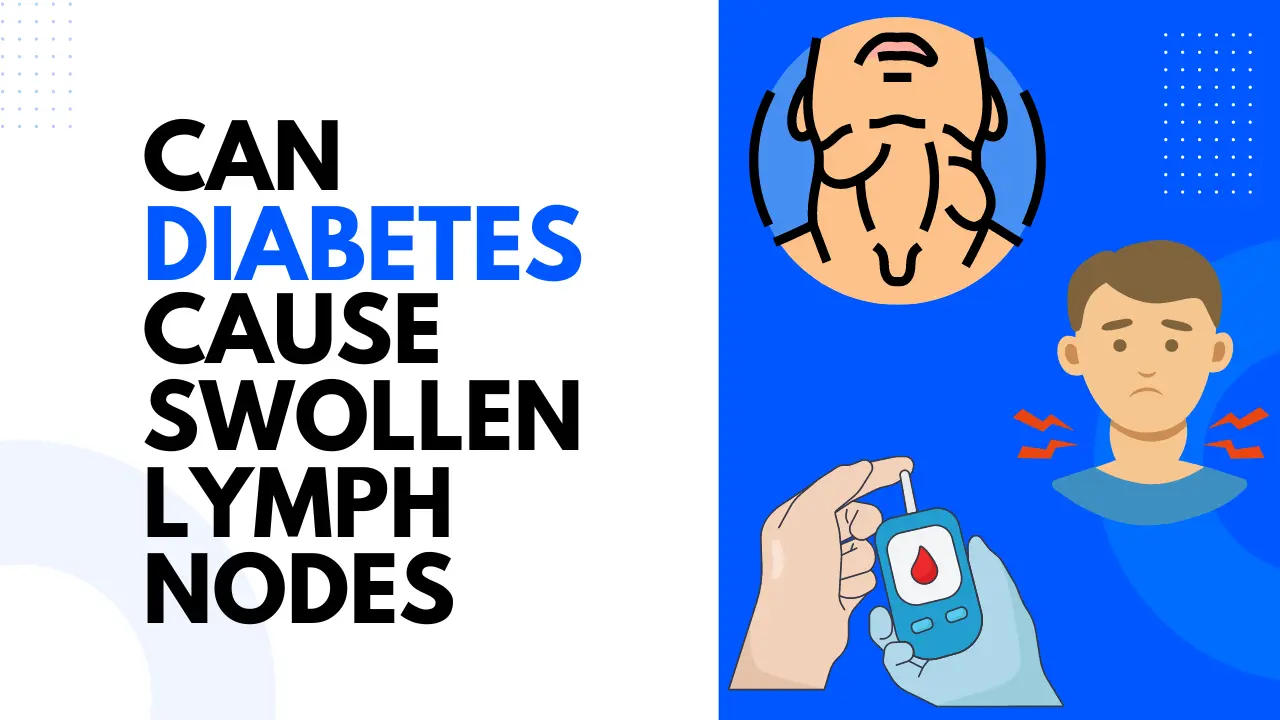Introduction
Swollen lymph nodes can be caused by a variety of health conditions, from simple viral infections to more serious illnesses like cancer. For those living with diabetes, swollen lymph nodes may also be an issue. But can diabetes directly cause swollen lymph glands? Or is the relationship more complicated than that? In this article, we will examine the complex link between diabetes and swollen lymph nodes. We will look at how diabetes affects your health in ways that can indirectly lead to swollen nodes. Understanding this connection is important for managing your diabetes properly and catching complications early.
So. let’s understand the question – Can Diabetes Cause Swollen Lymph Nodes?
Do read the People Also Ask (FAQs) about this topic.
Key Takeaways
- While diabetes does not directly cause swollen lymph nodes, uncontrolled blood sugar can lead to conditions like infections, fluid buildup, and circulation issues that commonly result in swollen glands. Properly managing diabetes helps prevent complications that indirectly cause swollen lymph nodes.
- Uncontrolled diabetes can contribute to conditions like lymphedema, lymphangitis, and certain cancers that commonly cause swollen lymph nodes. The key link is that diabetes hinders circulation and immune function.
- Impaired blood flow and immunity make it easier for lymph fluid to pool in tissues and infections to take hold. Both fluid buildup and infection lead to inflamed, swollen lymph nodes.
- Swollen lymph nodes may seem minor but can act as a warning that diabetes is damaging blood vessels, nerves, and immunity. This makes the body more vulnerable to complications over time.
- Diligent diabetes self-care and medical care can help prevent issues like chronic lymphedema or cancer. Controlling blood sugar, nutrition, exercise, weight, preventive care, and managing stress are important.
Understanding Diabetes
To understand if and how diabetes contributes to swollen lymph nodes, we first need to understand what diabetes is and how it impacts your body. Diabetes is a disease in which your body cannot properly regulate its blood glucose (sugar) levels. There are two main types of diabetes:
Type 1 diabetes is an autoimmune disease in which the pancreas stops making insulin. Insulin is the hormone needed to transport glucose from the bloodstream into your cells to be used for energy. With no insulin, glucose builds up in the blood. This is why type 1 diabetes must be treated with insulin injections or an insulin pump.
Type 2 diabetes occurs when your body becomes resistant to insulin, so it cannot efficiently move glucose out of the blood and into cells. Type 2 diabetes is generally diagnosed later in life and can sometimes be managed through diet, exercise and oral medications rather than insulin.
In both types of diabetes, the hallmark sign is sustained elevated blood sugar levels. This has widespread effects throughout the body over time if not properly controlled. High blood glucose damages blood vessels and nerves. It also suppresses immune system function. These issues set the stage for developing swollen lymph nodes.
Understanding Lymph Nodes
To grasp the connection between diabetes and swollen glands, you must also comprehend the role of lymph nodes in your body. Lymph nodes are small, bean-shaped glands that are part of your lymphatic system. This is a network of vessels, ducts and nodes that carries a fluid called lymph throughout your body.
Lymph nodes act as filters for this lymphatic fluid, trapping viruses, bacteria and other harmful substances. Lymph nodes contain white blood cells that help fight infection. They remove waste and cellular debris from the lymph fluid before returning it to the bloodstream. Healthy lymph circulation relies on the pumping action of surrounding muscles.
There are hundreds of lymph nodes throughout the body. You often feel them as soft bumps under the skin of your neck, underarms, chest, abdomen or groin. When you have an infection, illness or localized inflammation, the lymph nodes nearest that region will often swell as they fill up with white blood cells to fight the infection. Swollen nodes feel like tender or painful lumps.
Can Diabetes Cause Swollen Lymph Nodes?
Now that we have reviewed both diabetes and the lymphatic system, we can analyze how they are indirectly connected. The key factor is that uncontrolled diabetes contributes to issues that commonly cause swollen lymph nodes.
The main conditions potentially leading to swollen lymph nodes that have a linkage to diabetes are:
- Lymphedema – This swelling occurs when lymph fluid cannot drain properly and builds up in soft tissues, usually in the arms and legs. In a clinical study, skin specimens of diabetic patients displayed increased lymphatic density, and transcriptional analysis of isolated dermal LECs indicated that cells from diabetic patients exhibit signatures of inflammation, adhesion, migration, growth, and lymphangiogenesis
- Lymphangitis – This is an infection of the lymph vessels themselves. It causes red, painful swelling along the infected channel. Diabetes increases susceptibility to such infections.
- Certain cancers – Uncontrolled diabetes may raise the risk for cancers like lymphoma and skin cancers. Tumors can obstruct proper lymph flow.
The common thread is that diabetes can hinder circulation and immune function. Impaired blood flow and immunity make it easier for lymph fluid to back up and pool in tissues. Infections also take hold more easily. Both fluid buildup and infection lead to inflamed, swollen lymph nodes downstream.
Now, If we are talking about Swollen Lymph Nodes you may also like to read about this topic – Can PCOS Cause Swollen Lymph Nodes?
Broader Implications
Looking at the connection between diabetes and swollen lymph nodes provides insight into the full-body impact diabetes can have over time. It shows how vital proper management is not just for day-to-day blood sugar control but for avoiding insidious complications down the road.
Swollen lymph glands from a simple skin infection or fluid buildup in the arm may seem minor initially. But it can act as a warning sign of the toll diabetes is taking through damage to blood vessels, nerves and immunity. It serves to notice that the body is becoming increasingly vulnerable to issues that a person without diabetes may easily fight off or overcome.
This demands taking a more holistic view of diabetes care. Simply measuring and moderating blood glucose is not enough. Those with diabetes must be vigilant against threats to overall cardiovascular and immune health in order to preserve quality of life. Catching complications early through regular screening allows for better outcomes.
Unique Data and Expert Advice
Recent medical research provides unique insights into the extent diabetes increases the risk for lymph-related complications:
- A 2013 study published in Diabetes found that type 2 diabetes is associated with enhanced lymph vessel density, remodelling, and inflammation, which may contribute to the development of lymphedema
- One study conducted a systematic review and meta-analysis of 13 studies and found a history of type 2 diabetes to be associated with a significantly elevated risk for diffuse large B-cell lymphoma among severely obese patients.
- A large, randomized controlled trial found that intensive blood sugar control significantly reduced the risk of developing microvascular complications like diabetic retinopathy, nephropathy, and neuropathy compared to standard control.
These findings emphasize the additive impact of diabetes on the lymph system over years and decades for those lacking glycemic control. However, through diligent self-care and medical care, developing issues like chronic lymphedema or cancers can be averted.
Practical Tips for Management
If you are diabetic and notice swollen or tender lymph nodes, see your doctor to determine the cause. Depending on examination and testing, treatment may include antibiotics for infection or physical therapy and compression garments for lymphedema.
To help prevent swollen lymph nodes related to your diabetes:
- Monitor blood glucose regularly per your doctor’s advice. Keep levels within your target range to prevent circulation issues.
- Follow a balanced, nutritious diet and stay active with cardio and strength training exercises to support immune health.
- Practice excellent care for any skin wounds to avoid infection. Promptly clean and bandage any cuts, blisters etc. Seek medical care for signs of infection.
- Wear well-fitting, protective footwear and inspect feet daily to detect any wounds as feet are prone to cuts.
- Take your diabetes medications and insulin as prescribed to maintain glycemic control.
- Aim for healthy weight management through diet and exercise. Excess weight strains lymph drainage.
- Manage stress effectively and get sufficient sleep to support immune function.
- Have regular medical exams and screening tests to catch any diabetes-related complications early.
When to Seek Medical Care
You should make an appointment with your doctor if you notice:
- Swelling lasting longer than 2-4 weeks
- Progressively enlarging lymph nodes
- Nodes that feel very hard or immovable
- Intense pain or pressure from nodes
- Swelling combined with unexplained weight loss or fever
Your doctor can run tests to determine the cause of the swollen nodes and provide appropriate treatment. Prompt medical attention prevents more serious complications.
Conclusion
In summary, while diabetes itself does not directly cause swollen lymph nodes, poor blood sugar control can set the stage for other conditions that lead to swollen glands. Lymphedema, lymphangitis and certain cancers become more likely over time when diabetes is not well controlled.
However, through diligent daily management of blood glucose, nutrition, exercise, weight, and preventive care, those with diabetes can avoid the development of such secondary health issues. Swollen lymph nodes may provide an early red flag that more focus is needed on optimal diabetes self-care and regulation. Identifying complications early on provides the greatest opportunity for intervention and safeguarding your health over the long haul.
People Also Asks (FAQs)
Q) Can diabetes affect lymph nodes?
A) Yes, diabetes can affect the lymph nodes. High blood sugar levels associated with uncontrolled diabetes can damage the small blood vessels around the body, including the lymph vessels. This damage can lead to improper drainage of the lymph fluid through the lymph nodes, causing them to become swollen or enlarged. The medical term for this is diabetic lymphedema.
Q) Can sugar affect lymph nodes?
A) Yes, high levels of sugar in the blood (hyperglycemia) can affect the lymph nodes. Uncontrolled diabetes leads to high blood sugar levels, which can damage the small blood vessels, including the lymph vessels. This impairs drainage of lymph fluid through the lymph nodes, potentially leading to swelling of the lymph nodes, also called lymphadenopathy. So diabetes and high blood sugar levels can directly impact lymph node health.
Q) What diseases cause swollen lymph nodes?
A) Several diseases and conditions can cause swollen or enlarged lymph nodes, known as lymphadenopathy. Some common causes include:
- Viral infections like mononucleosis, HIV, or the common cold.
- Bacterial infections like strep throat and tuberculosis.
- Fungal infections like ringworm.
- Cancers like leukaemia and lymphoma.
- Autoimmune diseases like rheumatoid arthritis and lupus.
- Diabetes, due to damage to lymph vessels causing drainage issues.
So diabetes is one of the diseases that can directly lead to swollen lymph nodes when blood sugar levels are very high.
Q) What are the symptoms of diabetic lymphedema?
A) The main symptoms of diabetic lymphedema include:
- Swelling or enlargement of lymph nodes, especially in the neck, armpit, or groin area.
- A feeling of heaviness or fullness in an arm or leg.
- Aching, pain, or discomfort where the lymph nodes are swollen.
- Decreased flexibility and range of motion in the affected limb.
- Tightness of the skin, scarring, or thickening/hardening of the skin.
- Decreased immune function, leading to more infections.
If lymph drainage is impaired over an extended period, the limb can become extremely swollen. Seeking medical treatment is important to reduce complications.
Q) Can diabetes cause lymph?
A) Diabetes does not directly cause an increase in lymph fluid production. However, it can impair drainage of lymph through the lymph system, leading to a buildup of lymph in the tissues. This happens when high blood sugar levels from uncontrolled diabetes damage the small blood vessels around the body, including the lymph vessels. Poor lymph drainage causes fluid buildup and swelling. The medical term for this type of lymph buildup and swelling is lymphedema, which can affect the arms, legs, or other areas in people with diabetes.











